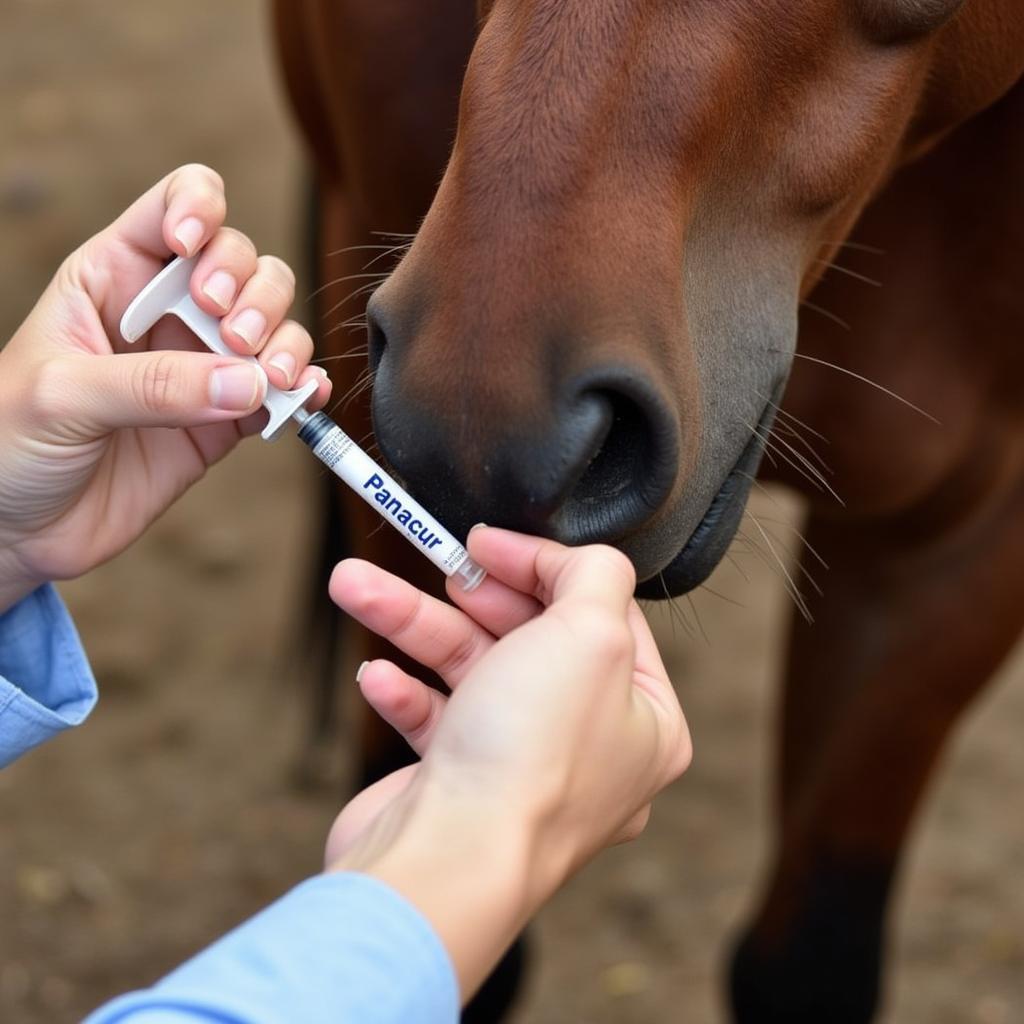Panacur For Horses is a common deworming medication used to control and treat various internal parasites. Understanding its proper usage, dosage, and potential side effects is crucial for maintaining your horse’s health. This comprehensive guide delves into everything you need to know about using Panacur effectively and safely.
Understanding Panacur and Its Uses in Horses
Panacur, also known by its generic name fenbendazole, is a broad-spectrum anthelmintic, meaning it’s effective against a wide range of parasitic worms. It works by disrupting the worms’ energy metabolism, ultimately leading to their death. Panacur is particularly effective against roundworms, lungworms, and some types of tapeworms. It’s available in various forms, including granules, paste, and suspension, making it easy to administer to horses of all ages.
Why is Deworming Important for Horses?
Internal parasites can significantly impact a horse’s health, leading to weight loss, colic, poor coat condition, and even death in severe cases. Regular deworming is a vital part of preventative healthcare for horses. By eliminating these parasites, you help ensure your horse stays healthy and performs at its best.
 Panacur Horse Deworming: A horse receiving Panacur paste orally.
Panacur Horse Deworming: A horse receiving Panacur paste orally.
Different Types of Panacur for Horses
Panacur comes in different formulations designed for specific needs. Panacur PowerPacs are a popular choice for convenience, providing pre-measured doses of granules. The paste form is also readily accepted by most horses and is suitable for single-dose treatments. For larger operations, the suspension can be more economical. Choosing the right type depends on your horse’s age, weight, and the specific parasite being targeted.
Administering Panacur: Dosage and Methods
Calculating the correct dosage of Panacur is essential for effective treatment. Always consult your veterinarian to determine the appropriate dose for your horse. The dosage is usually based on the horse’s weight and the specific parasitic infestation. Overdosing can be harmful, while underdosing may not effectively eliminate the parasites.
How to Give Panacur to Your Horse
Administering Panacur is relatively straightforward, depending on the chosen formulation. The paste is usually given orally using a syringe, ensuring the entire dose reaches the back of the horse’s tongue. Granules can be mixed with a small amount of feed. Always follow the instructions on the product label and consult with your vet if you have any questions.
Potential Side Effects and Precautions
While generally safe, Panacur can occasionally cause mild side effects such as diarrhea or loose stools. These are usually temporary and resolve on their own. In rare cases, allergic reactions can occur, requiring immediate veterinary attention.
When to Consult Your Veterinarian
If you observe any unusual symptoms in your horse after administering Panacur, or if the parasite problem persists, consult your veterinarian immediately. They can diagnose the issue and recommend the best course of action.
Panacur for Horses: A Vital Tool for Parasite Control
Panacur is a valuable tool for managing and treating internal parasites in horses. By understanding the proper usage, dosage, and potential side effects, horse owners can contribute significantly to their animals’ overall well-being. Regular deworming with Panacur, coupled with good hygiene practices, will help keep your horse healthy and thriving.
Conclusion
Panacur for horses is a key component of responsible horse ownership. By adhering to your veterinarian’s recommendations and following the guidelines outlined in this article, you can effectively manage internal parasites and ensure your equine companion enjoys a long and healthy life. Remember, regular deworming with Panacur is an investment in your horse’s health and happiness.
FAQ
- How often should I deworm my horse with Panacur?
- What are the signs of worms in horses?
- Can I use Panacur on pregnant mares?
- What is the difference between Panacur and other dewormers?
- How do I store Panacur?
- Can I give Panacur to my other animals?
- What should I do if my horse refuses to take Panacur?
Please contact us for support: Phone: 0772127271, Email: [email protected] Or visit us at: QGM2+WX2, Vị Trung, Vị Thuỷ, Hậu Giang, Vietnam. We have a 24/7 customer service team. We also have other helpful articles on our website about horse health and care.